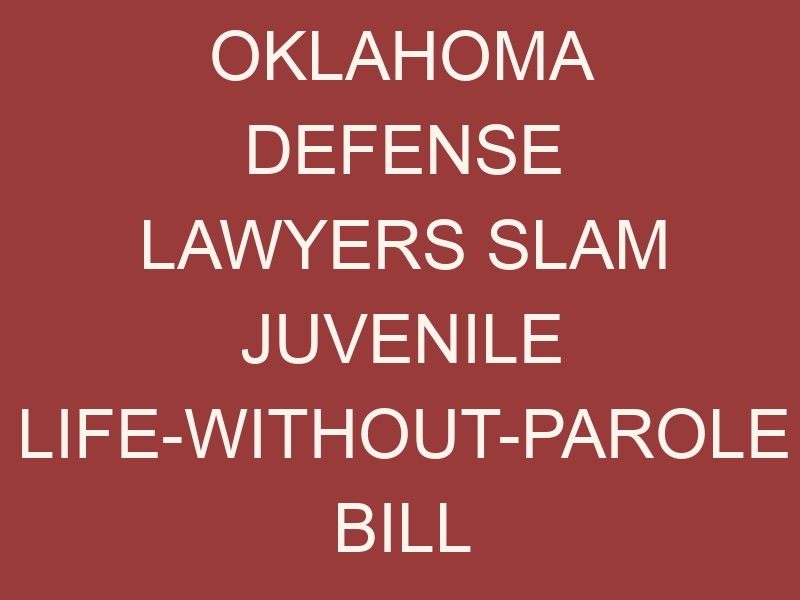The Oklahoma Criminal Defense Lawyers Association has released a scorching rebuke of a bill that would let judges sentence juveniles to life in prison without a chance for parole. Oklahoma law otherwise allows juries to determine sentences within limits set by law.
Different sentencing procedures would deny those juveniles equal protection of the law as guaranteed by the 14th Amendment of the U.S. Constitution.
The Alyssa Wiles Juvenile Life Without Parole Sentencing Act (2018 SB 1221) is unconstitutional, unjust and unconscionable, OCDLA President Al Hoch said in a public statement. The bill attempts to deprive the most vulnerable defendants rights otherwise afforded to any adult, Hoch said.
“On its face this Bill is unconstitutional in many ways. One of the most serious infringements on individual rights is the abolition of sentencing by a jury for the most serious of offenses and when dealing with the most vulnerable of defendants. This Bill seeks to take away the right of a juvenile to have a jury consider all evidence in aggravation and mitigation of a sentence as required by recent Oklahoma decisions as well as United States Supreme Court decisions.”
The bill addresses sentencing for youths charged with first-degree murder. Before youths under 18 years of age are bound over for trial, prosecutors would be allowed to seek a psychological evaluation. Within 30 days of receiving a completed evaluation, the state could then file a notice of intent to seek life-without-parole. Defense attorneys would then have 15 days to respond to the notice.
“An attorney for the juvenile will not have sufficient time to retain a qualified examiner and have the juvenile evaluated and (prepare) a response to the state’s attempt to have the juvenile sentenced to life without the possibility of parole. This Bill presupposes by its lack of time for a defense expert that all parties will be bound by the opinion of a person hired by the prosecution to provide an evaluation of the juvenile. This obviously violates basic due process and an ability to confront witnesses and provide a defense for an accused juvenile.”
The bill also sets out conditions under which juveniles already sentenced to unconstitutionally lengthy prison sentences could seek parole, or be considered for revised sentencing. A series of U.S. Supreme Court decisions have ruled that life sentences without an opportunity for parole for juvenile offenders comprise cruel and unusual punishment in violation of 8th Amendment U.S. Bill of Rights protections.
Provisions in the SB1221 to remedy Oklahoma’s history of unconstitutionally cruel life sentences allow the state to either request a court’s informal sentencing review or provide an opportunity for parole. By letting the state ask for an informal hearing, the proposed law denies those defendants a right to jury trial for sentencing purposes, the ODCLA president said.
“…this Bill seeks to create some supposed safety valve to avoid the mandated trials to correct errors in previous sentences by creating a review scenario which again places burden on the juvenile and removes any prosecution burden of the state.”
Among the prosecution burdens suspended for informal hearings are rules of evidence that would otherwise govern conduct of a formal sentencing hearing.
Even where the bill appears to be providing parole opportunities for those sentenced as youths to unconscionably long prison terms, the proposed law does not afford equal protection.
“This Bill could require a juvenile who has a relatively small amount of drugs and is prosecuted by an overly zealous state’s attorney to serve at least 25 calendar years in prison before even having the possibility of being considered for parole. No such burden exists for someone who commits such a violation at 19 or 20 years old.”
If it is signed into law, Oklahoma may waste vast amounts of time and money – paid to out of state attorneys – only to lose in its defense of the latest life-without-parole-for-children bill, Hoch said.
Sentencing cases involving juveniles and life without parole tend to attract out-of-state attorneys who focus on unjust juvenile sentencing nationwide.
Yet, it might not take out-of-state lawyers to shoot down a bill Oklahoma defense attorneys tend to see as outrageous. Legislators saddled the bill with amendments that make it as easy a target for constitutional challenge as the proverbial broad side of the barn.
The Oklahoma Supreme Court has recently overturned several laws passed in violation of our state’s constitutional single-subject rule. Legislation in Oklahoma can lawfully address only one subject. The juvenile sentencing bill approved by the House also included provisions changing education requirements for the Oklahoma Pardon and Parole Board, along with changes to Oklahoma sex offender registration laws.
The entanglement of subjects could stall the bill in conference committee – the place bills go after both sides of the legislature pass different versions of similar bills. The bill was introduced in the Senate as a sex offender registration bill then bounced among committees and floor votes as variously a sex-offender bill, a parole-board-qualifications bill and a juvenile sentencing bill. The final House version included all three subjects.
Gov. Mary Fallin in 2013 vetoed a similarly named bill that addressed prosecution of juvenile offenders. Falling said she vetoed the 2013 Alyssa D. Wiles Law then because it would treat juveniles charged as accessories to crimes more harshly than adults charged with similar crimes.



